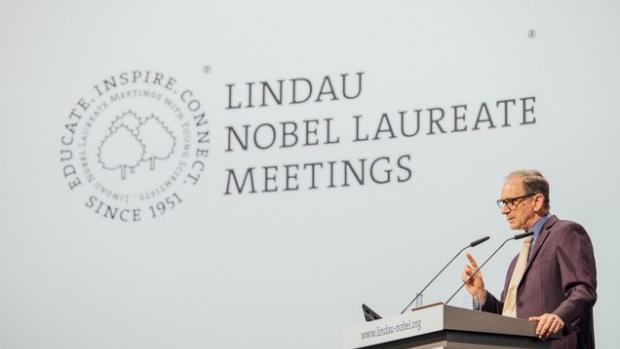Alum Martin Hellman addresses a gathering of Nobel Laureates

NYU Tandon Presidential Fellow and alumnus Martin Hellman speaking at this year's Lindau Nobel Laureate Meeting
NYU Tandon Presidential Fellow and alumnus Martin Hellman, who earned his bachelor’s degree in electrical engineering in 1966, is best known for co-inventing public key cryptography (PKC), a vital technology that enables secure Internet transactions. He contributes frequently to the ongoing computer privacy debate and was a key participant in the “first crypto war” of the late 1970s.
The author of more than 70 technical papers, 12 U.S, patents and a number of foreign equivalents, he holds many honors, including membership in the National Academy of Engineering and the ACM Turing Award, the top prize in computer science, often compared in prestige to the Nobel Prize.
An engaging speaker, he has lectured at NYU Tandon about the development of PKC, an edge-of-your-seat account involving battles with the National Security Agency (NSA), invocation of the International Traffic in Arms Regulations, lawyers, and threats of imprisonment.
On July 3, 2019, at a Lindau Meeting of Nobel Laureates, dozens of past winners of that august prize were treated to the tale, which Hellman related during the course of his wide-ranging presentation “The Technological Imperative for Ethical Evolution.” Pointing out that recent breakthroughs in areas like genetic engineering and machine learning are making it imperative for society to undergo a swift ethical evolution, he drew upon his own eventful life and career to provide lessons on building a better, more-moral world.
While Hellman’s Lindau audience was a select one, his lessons are universal and will be meaningful for anyone seeking to increase humanity’s chances of surviving and thriving.
Read Hellman's talk at the 69th Lindau Nobel Laureate Meeting:
The Technological Imperative for Ethical Evolution
Introduction
Almost overnight, the Manhattan Project transformed ethical decision making from a purely moral concern into one that is essential for the survival of civilization. In the words of Albert Einstein, “The unleashed power of the atom has changed everything save our modes of thinking and we thus drift toward unparalleled catastrophe.” [Nathan and Norden 1981]
Environmental crises such as climate change, along with recent technological breakthroughs in genetic engineering, AI, and cyber-technology are adding to the technological imperative for accelerating humanity’s ethical evolution.
This paper presents eight lessons for accelerating that process, often using examples where I either failed to behave ethically or encountered great difficulty in doing so. I hope it thereby adds, however meagerly, to humanity’s odds of avoiding Einstein’s “unparalleled catastrophe” and, instead, building a world that we can be proud to pass on to future generations. No one person can solve this problem, but if enough of us move things a little, all together we can succeed.




